
chat-ollama
ChatOllama is an open-source AI chatbot that brings cutting-edge language models to your fingertips while keeping your data private and secure.
Stars: 3357
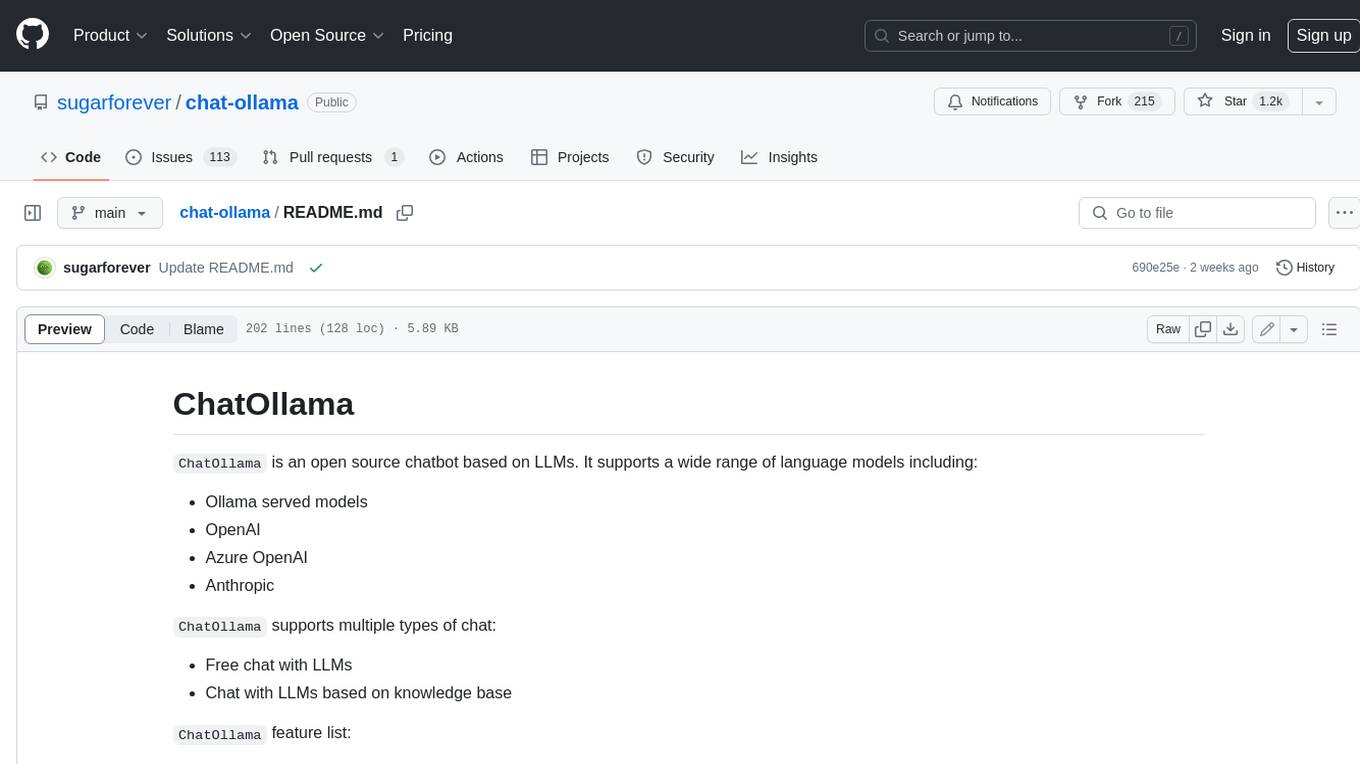
ChatOllama is an open-source chatbot based on LLMs (Large Language Models). It supports a wide range of language models, including Ollama served models, OpenAI, Azure OpenAI, and Anthropic. ChatOllama supports multiple types of chat, including free chat with LLMs and chat with LLMs based on a knowledge base. Key features of ChatOllama include Ollama models management, knowledge bases management, chat, and commercial LLMs API keys management.
README:
English | 简体中文
🔐 New ACL Feature (2025-08-25): Access Control Lists (ACL) for MCP server management! Control who can configure MCP servers with
ACL_ENABLEDenvironment variable. Learn more about ACL configuration →
🤖 Deep Agents Support (2025-08-19): ChatOllama now supports AI Agents with tool access! Currently requires Anthropic API key. Please refer to
.env.exampleand setANTHROPIC_API_KEYin.env. Tools are configured through MCP settings. Visit/agentsto get started.
📢 Database Migration Notice (2025-08-14): ChatOllama has moved from SQLite to PostgreSQL as the primary database provider for better performance and scalability.
ChatOllama is an open source chatbot platform built with Nuxt 3, supporting a wide range of language models and advanced features including knowledge bases, realtime voice chat, and Model Context Protocol (MCP) integration.
- OpenAI / Azure OpenAI
- Anthropic
- Google Gemini
- Groq
- Moonshot
- Ollama
- OpenAI API compatible service providers
- AI Agents - Intelligent agents with tool access for research and task execution
- Multi-modal Chat - Text and image input support
- Knowledge Bases - RAG (Retrieval Augmented Generation) with document upload
- Realtime Voice Chat - Voice conversations with Gemini 2.0 Flash
- Model Context Protocol (MCP) - Extensible tool integration
- Vector Databases - Chroma and Milvus support
- Docker Support - Easy deployment with Docker Compose
- Internationalization - Multi-language support
Choose your preferred deployment method:
The easiest way to get started. Download docker-compose.yaml and run:
docker compose upAccess ChatOllama at http://localhost:3000
For development or customization:
-
Prerequisites
- Node.js 18+ and pnpm
- Local PostgreSQL database server
- Ollama server running on http://localhost:11434
- ChromaDB or Milvus vector database
-
Installation
git clone [email protected]:sugarforever/chat-ollama.git cd chat-ollama cp .env.example .env pnpm install
-
Database Setup
- Create a PostgreSQL database
- Configure the database URL in
.env - Run migrations:
pnpm prisma migrate deploy
-
Start Development
pnpm dev
If you're upgrading from a previous version that used SQLite, follow these steps to migrate your data:
No action required! Docker deployments handle the migration automatically:
- The PostgreSQL service starts automatically
- Database migrations run on container startup
- Your existing data will be preserved
-
Backup your existing SQLite data (if you have important chat history):
cp chatollama.sqlite chatollama.sqlite.backup
-
Install and setup PostgreSQL:
# macOS with Homebrew brew install postgresql brew services start postgresql # Create database and user psql postgres CREATE DATABASE chatollama; CREATE USER chatollama WITH PASSWORD 'your_password'; GRANT ALL PRIVILEGES ON DATABASE chatollama TO chatollama; \q
-
Update your
.envfile:# Replace SQLite URL with PostgreSQL DATABASE_URL="postgresql://chatollama:your_password@localhost:5432/chatollama"
-
Run database migrations:
pnpm prisma migrate deploy
-
Migrate existing SQLite data (if you have chat history to preserve):
pnpm migrate:sqlite-to-postgres
ChatOllama supports two vector databases. Configure in your .env file:
# Choose: chroma or milvus
VECTOR_STORE=chroma
CHROMADB_URL=http://localhost:8000
MILVUS_URL=http://localhost:19530ChromaDB Setup (Default)
docker run -d -p 8000:8000 chromadb/chromaKey configuration options in .env:
# Access Control
ACL_ENABLED=false # Set to 'true' for production (admin-only MCP management)
# Database
DATABASE_URL=file:../../chatollama.sqlite
# Server
PORT=3000
HOST=
# Vector Database
VECTOR_STORE=chroma
CHROMADB_URL=http://localhost:8000
# Optional: API Keys for commercial models
OPENAI_API_KEY=your_openai_key
ANTHROPIC_API_KEY=your_anthropic_key
GOOGLE_API_KEY=your_gemini_key
GROQ_API_KEY=your_groq_key
MOONSHOT_API_KEY=your_moonshot_key
# Optional: Proxy settings
NUXT_PUBLIC_MODEL_PROXY_ENABLED=false
NUXT_MODEL_PROXY_URL=http://127.0.0.1:1080
# Optional: Cohere for reranking
COHERE_API_KEY=your_cohere_keyYou can enable or disable major product areas via feature flags. These can be set at build time using .env, or at runtime in Docker using NUXT_-prefixed variables.
-
Available features
-
MCP (Model Context Protocol) → toggles
Settings → MCPmodule. Flag:mcpEnabled -
Knowledge Bases → toggles Knowledge Bases menu and pages. Flag:
knowledgeBaseEnabled -
Realtime Chat → toggles
/realtimevoice chat page. Flag:realtimeChatEnabled -
Models Management → toggles
Modelsmenu and/modelspage. Flag:modelsManagementEnabled
-
MCP (Model Context Protocol) → toggles
-
Docker (recommended for deployments) Set runtime overrides with
NUXT_variables indocker-compose.yaml:services: chatollama: environment: - NUXT_MCP_ENABLED=true - NUXT_KNOWLEDGE_BASE_ENABLED=true - NUXT_REALTIME_CHAT_ENABLED=true - NUXT_MODELS_MANAGEMENT_ENABLED=true
-
.env (build time during
pnpm build) If you are building locally (non-Docker) or creating a custom image, you can set:MCP_ENABLED=true KNOWLEDGE_BASE_ENABLED=true REALTIME_CHAT_ENABLED=true MODELS_MANAGEMENT_ENABLED=true
Note: These are evaluated when
nuxt.config.tsis built. For prebuilt Docker images, prefer theNUXT_variables above to override at runtime. -
Notes
-
NUXT_variables map directly toruntimeConfigkeys at runtime and take precedence in containers. - Using
MCP_ENABLED=truein Compose will not override a prebuilt image’sruntimeConfig; useNUXT_MCP_ENABLED=trueinstead.
-
ChatOllama integrates with MCP to extend AI capabilities through external tools and data sources. MCP servers are managed through a user-friendly interface in Settings.
ChatOllama provides flexible access control for MCP server management to support both development and production environments.
Permission Modes:
-
ACL_ENABLED=false(default): Open access - all users can manage MCP servers -
ACL_ENABLED=true: Restricted access - only admin/superadmin users can manage MCP servers
🔧 Development & Personal Use (Recommended: ACL_ENABLED=false)
# .env file
ACL_ENABLED=falseUser Experience by Role:
| User Type | ACL_ENABLED=false | ACL_ENABLED=true |
|---|---|---|
| Unauthenticated | ✅ Full MCP access | ❌ Admin required |
| Regular User | ✅ Full MCP access | ❌ Admin required |
| Admin | ✅ Full MCP access | ✅ Full MCP access |
| Super Admin | ✅ Full MCP access | ✅ Full MCP access |
Important Notes:
- MCP Tool Usage: All users can use configured MCP tools in chat regardless of ACL setting
- Backward Compatibility: Existing installations continue working without changes
-
Migration Safe: Enable ACL anytime by setting
ACL_ENABLED=true
Supported Transport Types:
- STDIO - Command-line tools (most common)
- Server-Sent Events (SSE) - HTTP-based streaming
- Streamable HTTP - HTTP-based communication
Configuration via Settings UI:
- Navigate to Settings → MCP
- Click "Add Server" to create a new MCP server
- Configure server details:
- Name: Descriptive server name
- Transport: Choose STDIO, SSE, or Streamable HTTP
- Command/Args (STDIO): Executable path and arguments
- URL (SSE/HTTP): Server endpoint URL
- Environment Variables: API keys and configuration
- Enable/Disable: Toggle server status
STDIO Server Example:
Name: Filesystem Tools
Transport: stdio
Command: uvx
Args: mcp-server-filesystem
Environment Variables:
PATH: ${PATH}
Migration from Legacy Config:
If you have an existing .mcp-servers.json file:
pnpm exec ts-node scripts/migrate-mcp-servers.tsPopular MCP Servers:
-
mcp-server-filesystem- File system operations -
mcp-server-git- Git repository management -
mcp-server-sqlite- SQLite database queries -
mcp-server-brave-search- Web search capabilities
How MCP Works in Chat: When MCP servers are enabled, their tools become available to AI models during conversations. The AI can automatically call these tools to:
- Read/write files when discussing code
- Search the web for current information
- Query databases for specific data
- Perform system operations as needed
Tools are loaded dynamically and integrated seamlessly into the chat experience.
Common Issues and Solutions:
-
"Admin access required" message appears:
-
Cause:
ACL_ENABLED=trueand user lacks admin privileges - Solution: Either disable ACL or promote user to admin
# Option 1: Disable ACL (development) ACL_ENABLED=false # Option 2: Promote user to admin (contact super admin)
-
Cause:
-
Cannot access MCP settings after enabling ACL:
- Cause: No admin account exists
- Solution: Create super admin account
# Set before first user signup SUPER_ADMIN_NAME=admin-username -
MCP tools not working in chat:
- Cause: MCP feature disabled or servers misconfigured
- Solution: Check MCP feature flag and server status
# Enable MCP feature NUXT_MCP_ENABLED=true # Docker MCP_ENABLED=true # .env
-
Permission changes not taking effect:
- Cause: Browser cache or session issue
- Solution: Logout and login again, or restart application
Before setting SUPER_ADMIN_NAME:
- The first user to sign up automatically becomes super admin
After setting SUPER_ADMIN_NAME:
- Only the user with the specified username becomes super admin when they sign up
- Set in
.envfile:SUPER_ADMIN_NAME=your-admin-username - Or in Docker: add to environment variables
Managing existing users:
- Use the promotion script tool to manage super admin roles:
# Promote existing user to super admin pnpm promote-super-admin username_or_email # List current super admins pnpm promote-super-admin --list
Super Admin Capabilities:
- Promote regular users to admin
- Manage all MCP servers (when ACL enabled)
- Access user management interface
- Configure system-wide settings
Admin Capabilities:
- Manage MCP servers (when ACL enabled)
- Cannot promote other users
Regular User Capabilities:
- Use all chat features and MCP tools
- Manage MCP servers (only when ACL disabled)
# Recommended production settings
ACL_ENABLED=false # Default: open access to MCP management
SUPER_ADMIN_NAME=admin # Set super admin username
AUTH_SECRET=your-long-random-secret-key-hereEnable voice conversations with Gemini 2.0 Flash:
- Set your Google API key in Settings
- Enable "Realtime Chat" in Settings
- Click the microphone icon to start voice conversations
- Access via
/realtimepage
Create knowledge bases for RAG conversations:
- Create Knowledge Base - Name and configure chunking parameters
- Upload Documents - PDF, DOCX, TXT files supported
- Chat with Knowledge - Reference your documents in conversations
Supported Vector Databases:
- ChromaDB (default) - Lightweight, easy setup
- Milvus - Production-scale vector database
Docker Deployment:
- Vector Data - Stored in Docker volumes (chromadb_volume)
-
Relational Data - SQLite database at
~/.chatollama/chatollama.sqlite - Redis - Session and caching data
Development:
- Database - Local SQLite file
- Vector Store - External ChromaDB/Milvus instance
chatollama/
├── components/ # Vue components
├── pages/ # Nuxt pages (routing)
├── server/ # API routes and server logic
├── prisma/ # Database schema and migrations
├── locales/ # Internationalization files
├── config/ # Configuration files
└── docker-compose.yaml # Docker deployment
# Development
pnpm dev # Start development server
pnpm build # Build for production
pnpm preview # Preview production build
# Database
pnpm prisma-migrate # Run database migrations
pnpm prisma-generate # Generate Prisma client
pnpm prisma-push # Push schema changes
# User Management
pnpm promote-super-admin <username|email> # Promote user to super admin
pnpm promote-super-admin --list # List all super admins-
Keep dependencies updated:
pnpm installafter eachgit pull -
Run migrations:
pnpm prisma-migratewhen schema changes - Follow conventions: Use TypeScript, Vue 3 Composition API, and Tailwind CSS
- Test thoroughly: Verify both Docker and development setups
- Frontend: Nuxt 3, Vue 3, Nuxt UI, Tailwind CSS
- Backend: Nitro (Nuxt server), Prisma ORM
- Database: SQLite (development), PostgreSQL (production ready)
- Vector DB: ChromaDB, Milvus
- AI/ML: LangChain, Ollama, OpenAI, Anthropic, Google AI
- Deployment: Docker, Docker Compose
Join our Discord community for support, discussions, and updates:
- #technical-discussion - For contributors and technical discussions
- #customer-support - Get help with usage issues and troubleshooting
- #general - Community chat and announcements
For Tasks:
Click tags to check more tools for each tasksFor Jobs:
Alternative AI tools for chat-ollama
Similar Open Source Tools

chat-ollama
ChatOllama is an open-source chatbot based on LLMs (Large Language Models). It supports a wide range of language models, including Ollama served models, OpenAI, Azure OpenAI, and Anthropic. ChatOllama supports multiple types of chat, including free chat with LLMs and chat with LLMs based on a knowledge base. Key features of ChatOllama include Ollama models management, knowledge bases management, chat, and commercial LLMs API keys management.
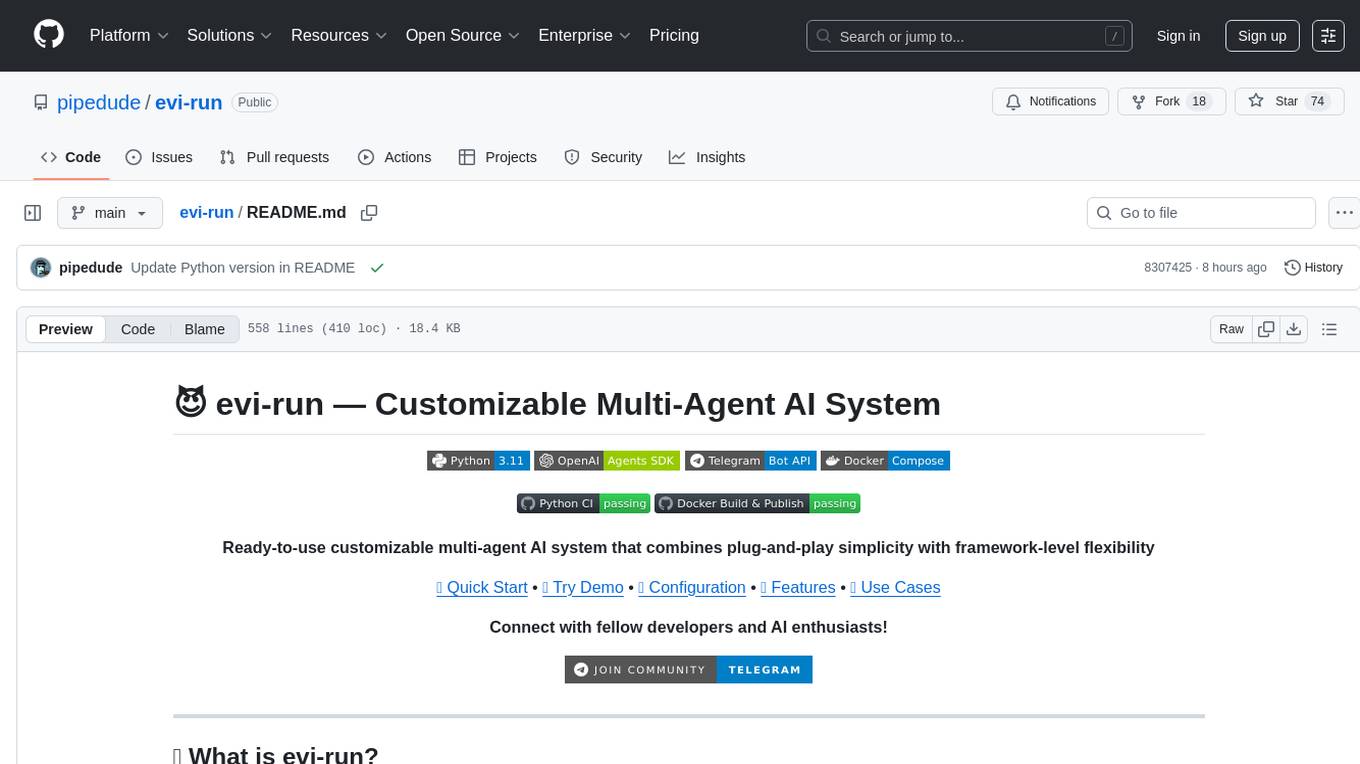
evi-run
evi-run is a powerful, production-ready multi-agent AI system built on Python using the OpenAI Agents SDK. It offers instant deployment, ultimate flexibility, built-in analytics, Telegram integration, and scalable architecture. The system features memory management, knowledge integration, task scheduling, multi-agent orchestration, custom agent creation, deep research, web intelligence, document processing, image generation, DEX analytics, and Solana token swap. It supports flexible usage modes like private, free, and pay mode, with upcoming features including NSFW mode, task scheduler, and automatic limit orders. The technology stack includes Python 3.11, OpenAI Agents SDK, Telegram Bot API, PostgreSQL, Redis, and Docker & Docker Compose for deployment.
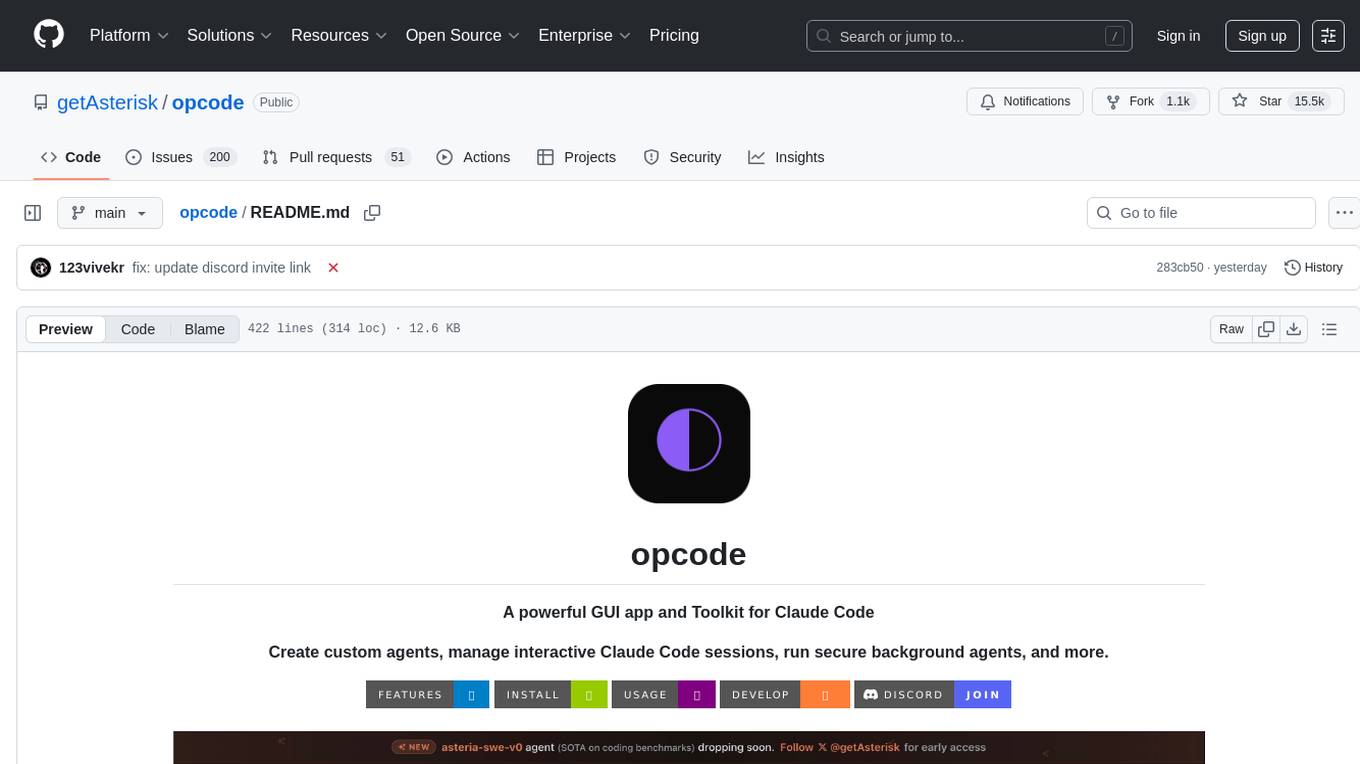
opcode
opcode is a powerful desktop application built with Tauri 2 that serves as a command center for interacting with Claude Code. It offers a visual GUI for managing Claude Code sessions, creating custom agents, tracking usage, and more. Users can navigate projects, create specialized AI agents, monitor usage analytics, manage MCP servers, create session checkpoints, edit CLAUDE.md files, and more. The tool bridges the gap between command-line tools and visual experiences, making AI-assisted development more intuitive and productive.
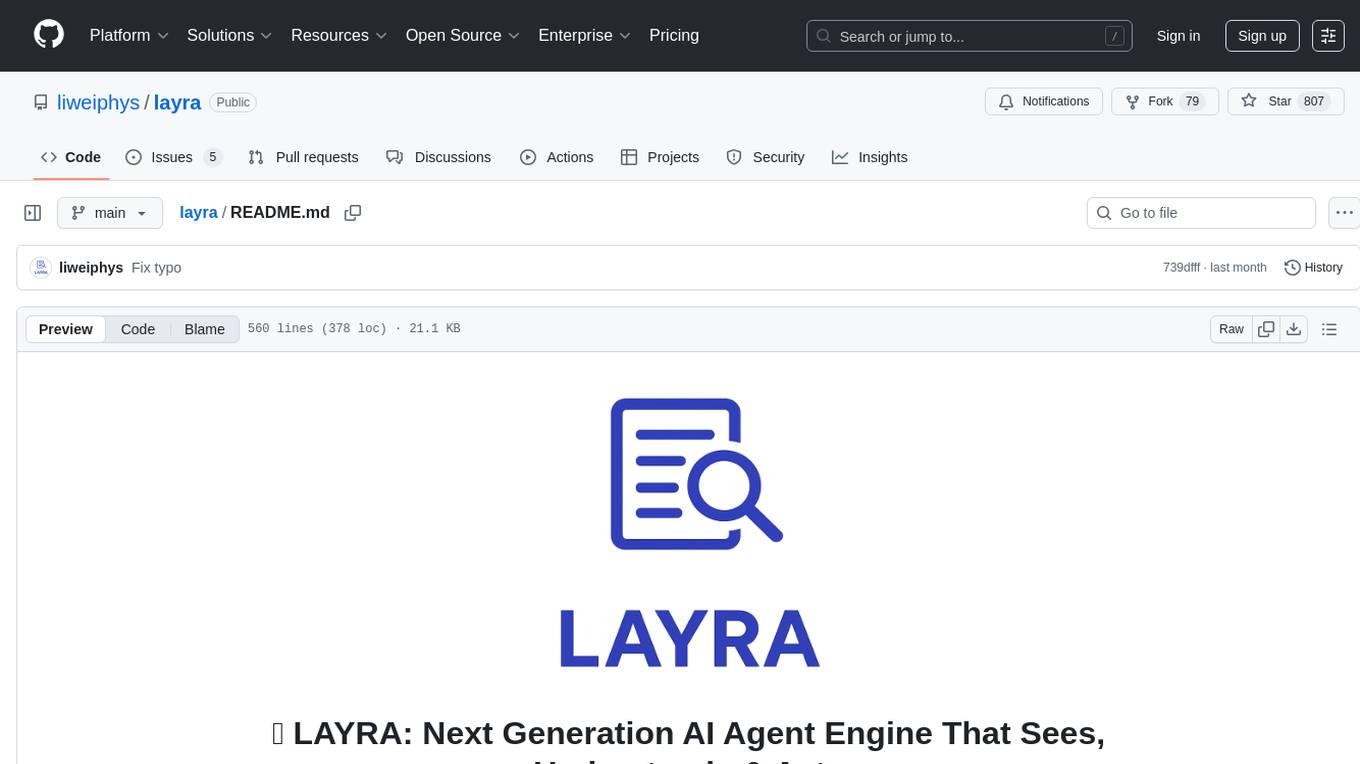
layra
LAYRA is the world's first visual-native AI automation engine that sees documents like a human, preserves layout and graphical elements, and executes arbitrarily complex workflows with full Python control. It empowers users to build next-generation intelligent systems with no limits or compromises. Built for Enterprise-Grade deployment, LAYRA features a modern frontend, high-performance backend, decoupled service architecture, visual-native multimodal document understanding, and a powerful workflow engine.
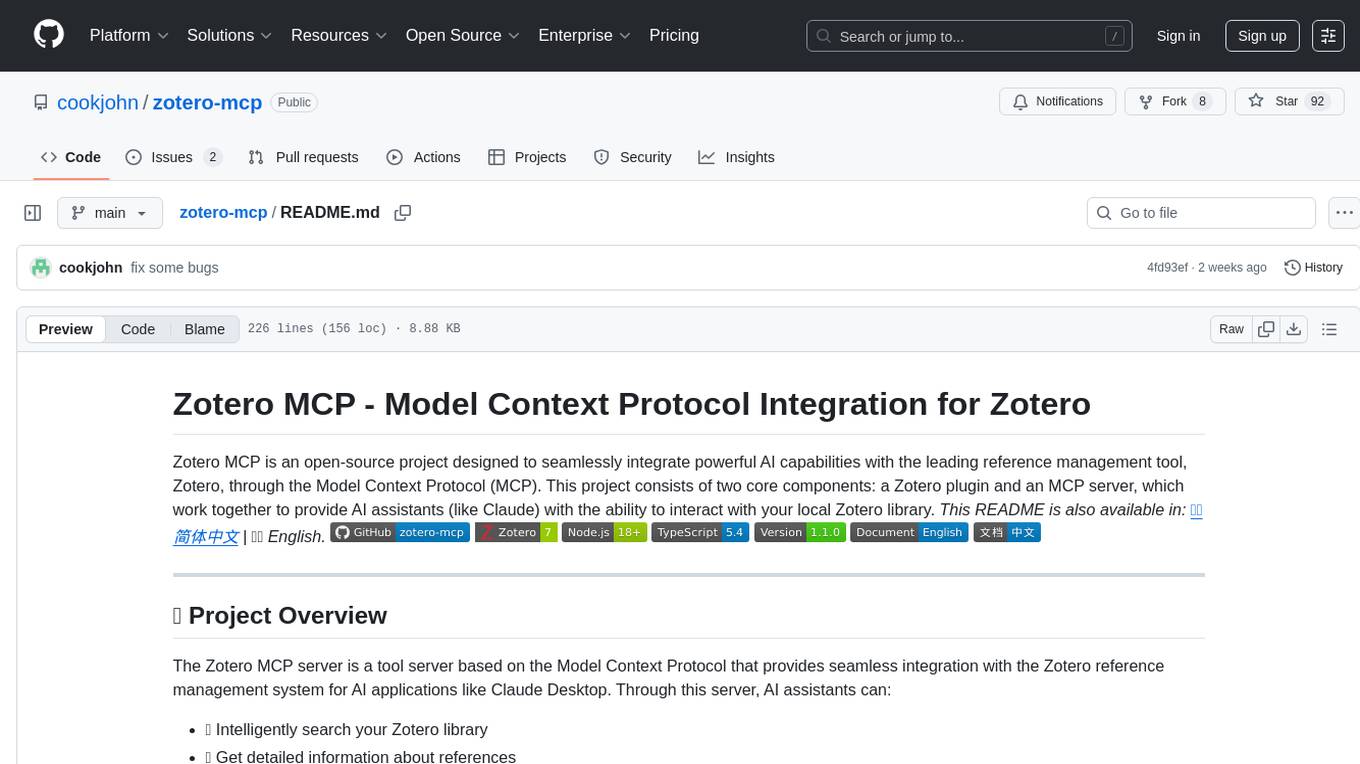
zotero-mcp
Zotero MCP is an open-source project that integrates AI capabilities with Zotero using the Model Context Protocol. It consists of a Zotero plugin and an MCP server, enabling AI assistants to search, retrieve, and cite references from Zotero library. The project features a unified architecture with an integrated MCP server, eliminating the need for a separate server process. It provides features like intelligent search, detailed reference information, filtering by tags and identifiers, aiding in academic tasks such as literature reviews and citation management.
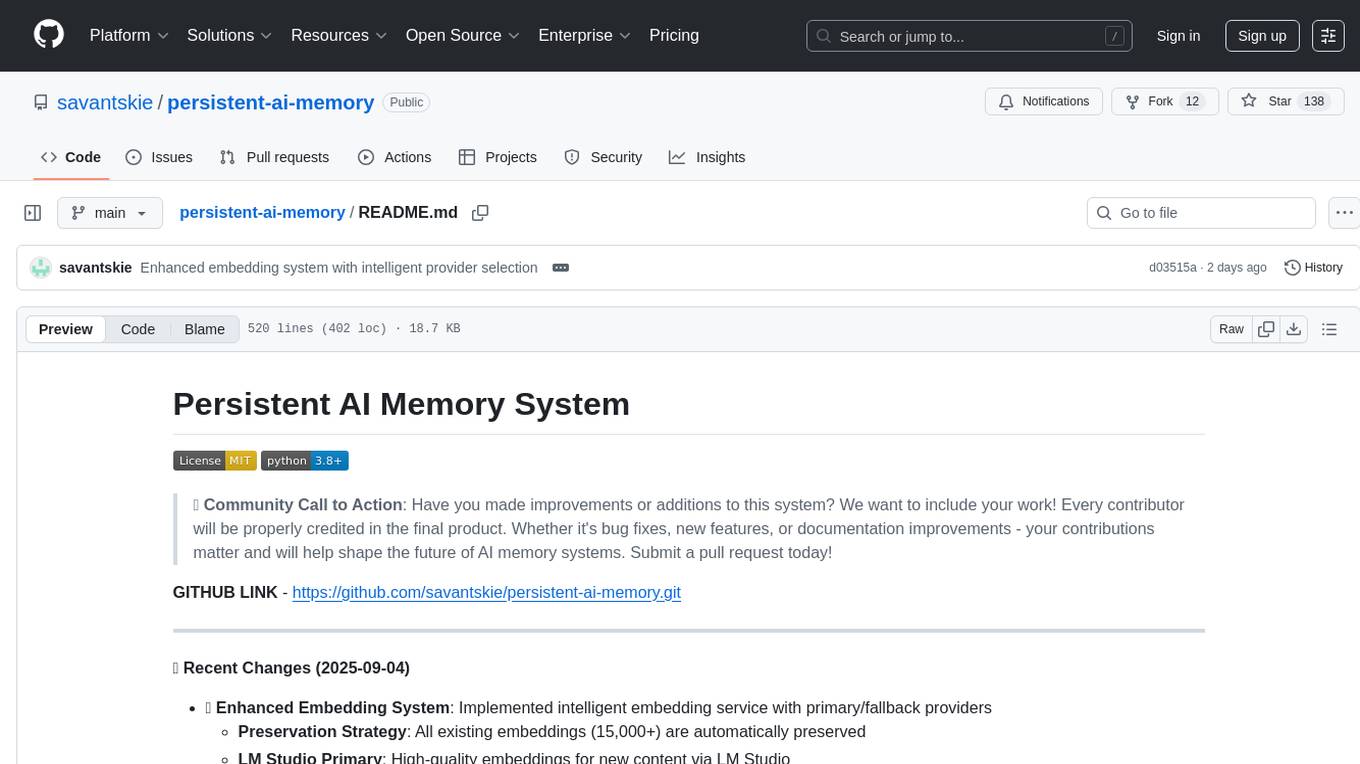
persistent-ai-memory
Persistent AI Memory System is a comprehensive tool that offers persistent, searchable storage for AI assistants. It includes features like conversation tracking, MCP tool call logging, and intelligent scheduling. The system supports multiple databases, provides enhanced memory management, and offers various tools for memory operations, schedule management, and system health checks. It also integrates with various platforms like LM Studio, VS Code, Koboldcpp, Ollama, and more. The system is designed to be modular, platform-agnostic, and scalable, allowing users to handle large conversation histories efficiently.
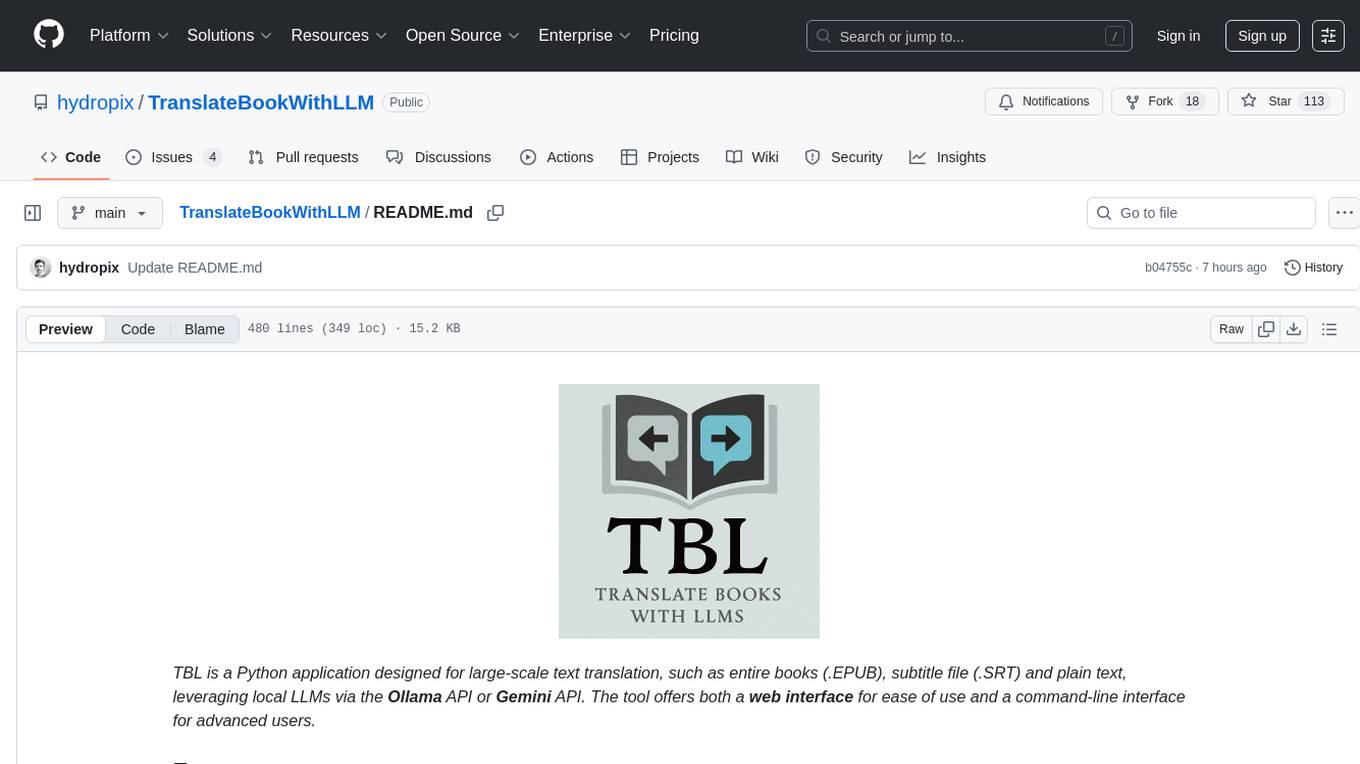
TranslateBookWithLLM
TranslateBookWithLLM is a Python application designed for large-scale text translation, such as entire books (.EPUB), subtitle files (.SRT), and plain text. It leverages local LLMs via the Ollama API or Gemini API. The tool offers both a web interface for ease of use and a command-line interface for advanced users. It supports multiple format translations, provides a user-friendly browser-based interface, CLI support for automation, multiple LLM providers including local Ollama models and Google Gemini API, and Docker support for easy deployment.
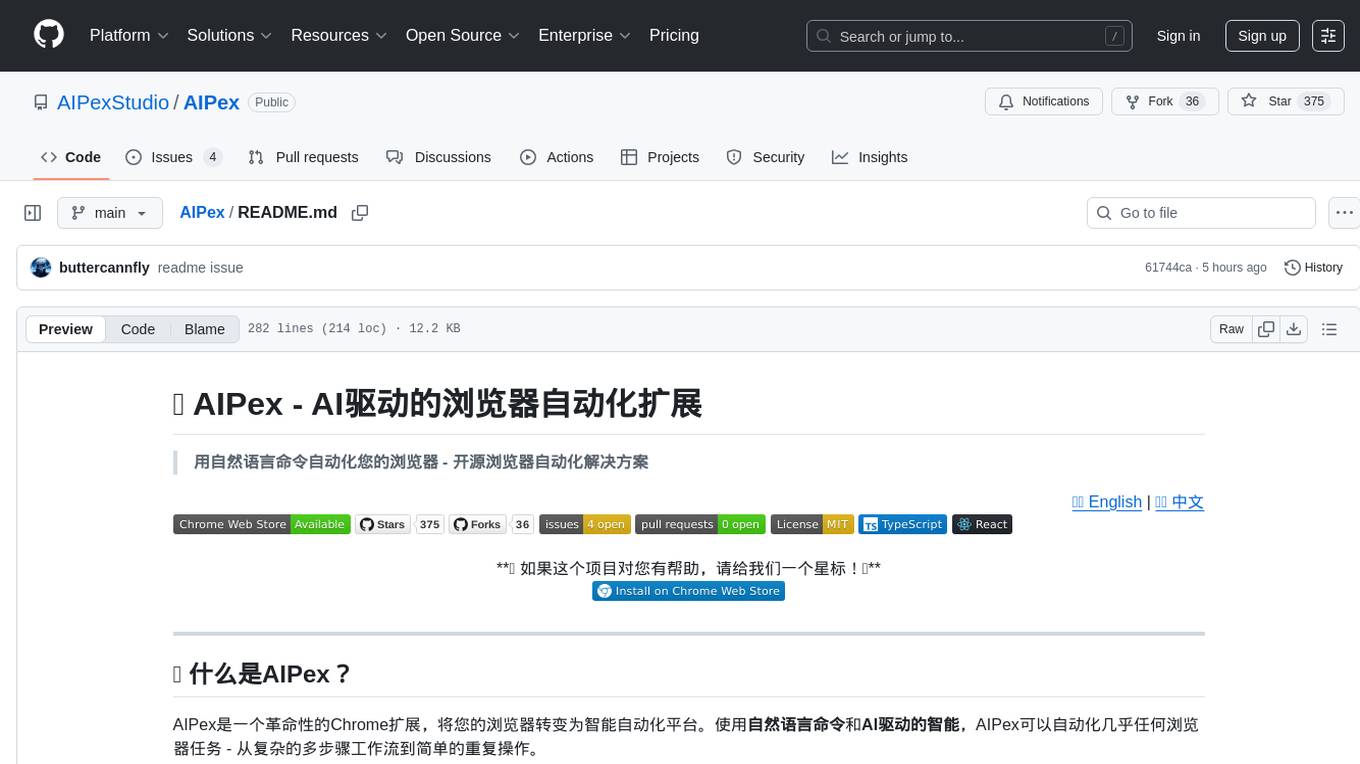
AIPex
AIPex is a revolutionary Chrome extension that transforms your browser into an intelligent automation platform. Using natural language commands and AI-powered intelligence, AIPex can automate virtually any browser task - from complex multi-step workflows to simple repetitive actions. It offers features like natural language control, AI-powered intelligence, multi-step automation, universal compatibility, smart data extraction, precision actions, form automation, visual understanding, developer-friendly with extensive API, and lightning-fast execution of automation tasks.
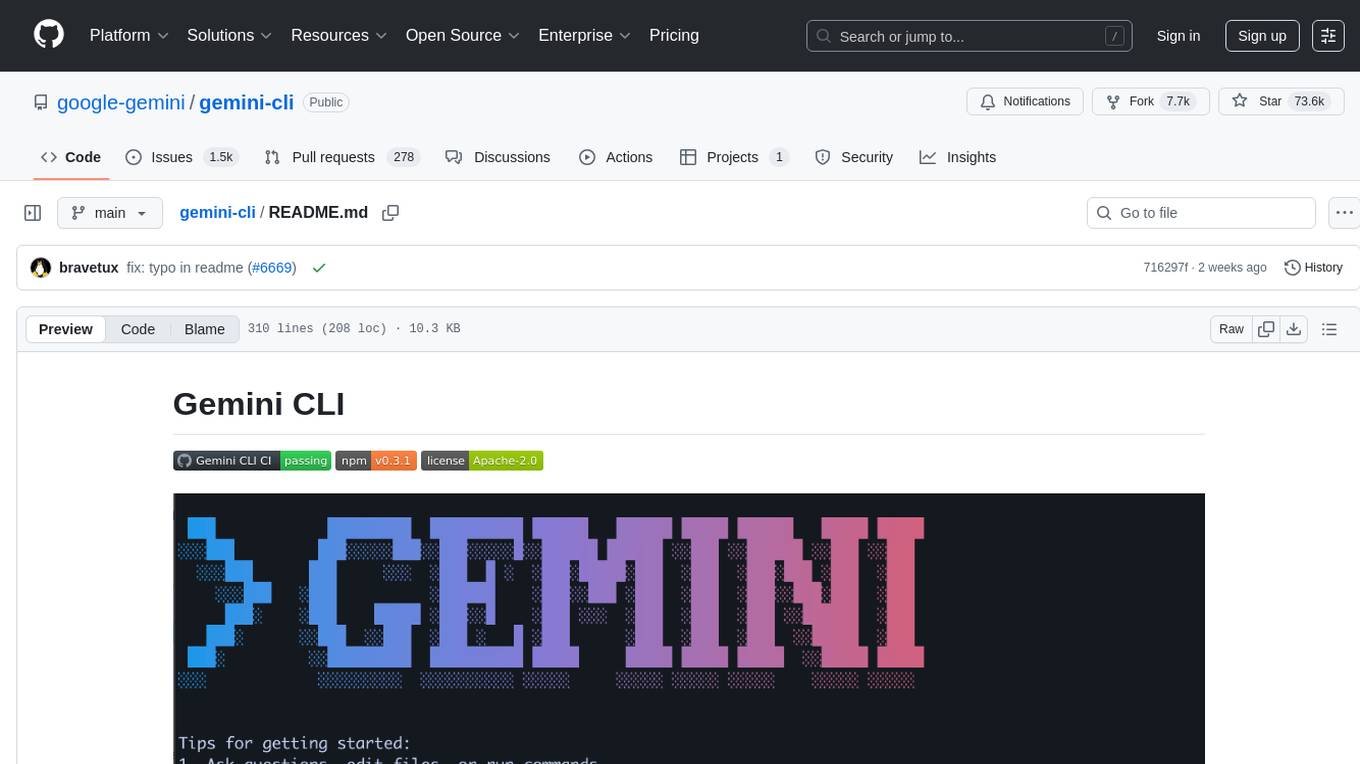
gemini-cli
Gemini CLI is an open-source AI agent that provides lightweight access to Gemini, offering powerful capabilities like code understanding, generation, automation, integration, and advanced features. It is designed for developers who prefer working in the command line and offers extensibility through MCP support. The tool integrates directly into GitHub workflows and offers various authentication options for individual developers, enterprise teams, and production workloads. With features like code querying, editing, app generation, debugging, and GitHub integration, Gemini CLI aims to streamline development workflows and enhance productivity.
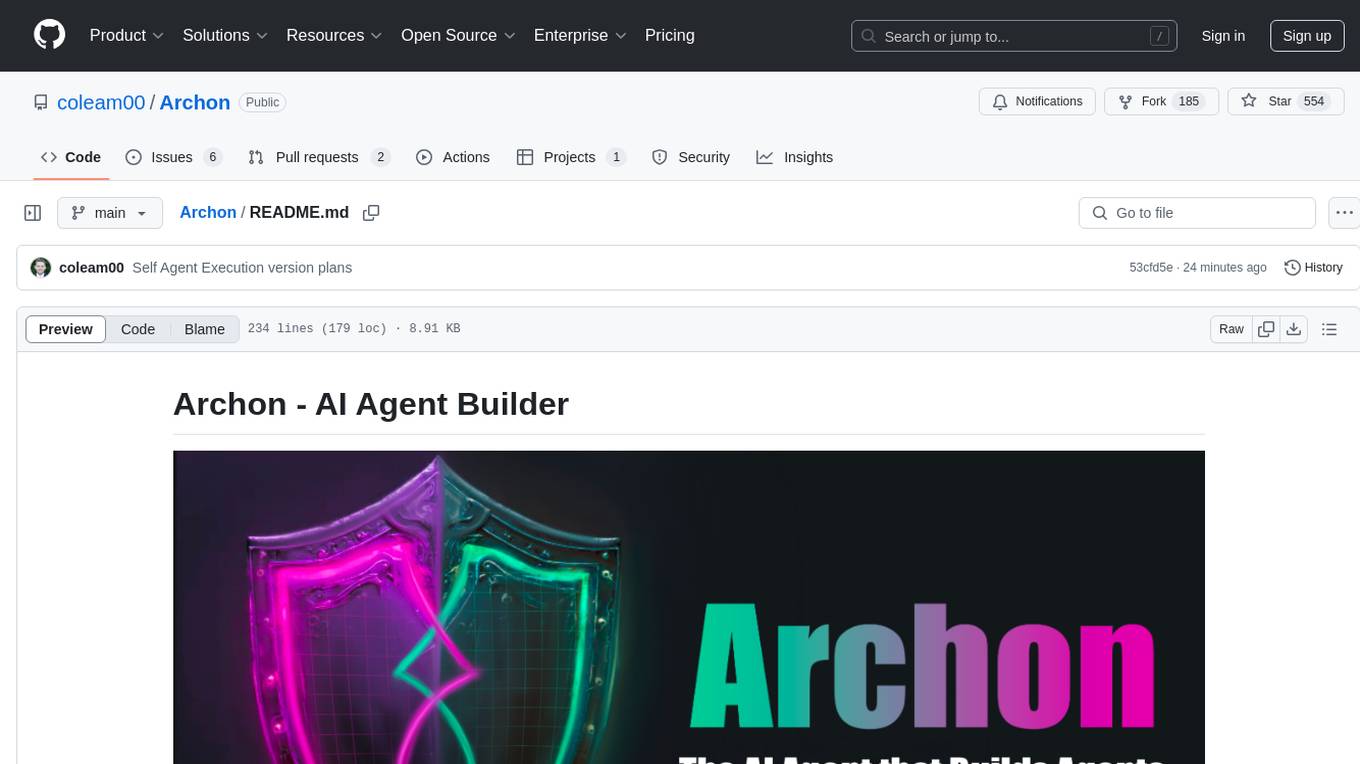
Archon
Archon is an AI meta-agent designed to autonomously build, refine, and optimize other AI agents. It serves as a practical tool for developers and an educational framework showcasing the evolution of agentic systems. Through iterative development, Archon demonstrates the power of planning, feedback loops, and domain-specific knowledge in creating robust AI agents.
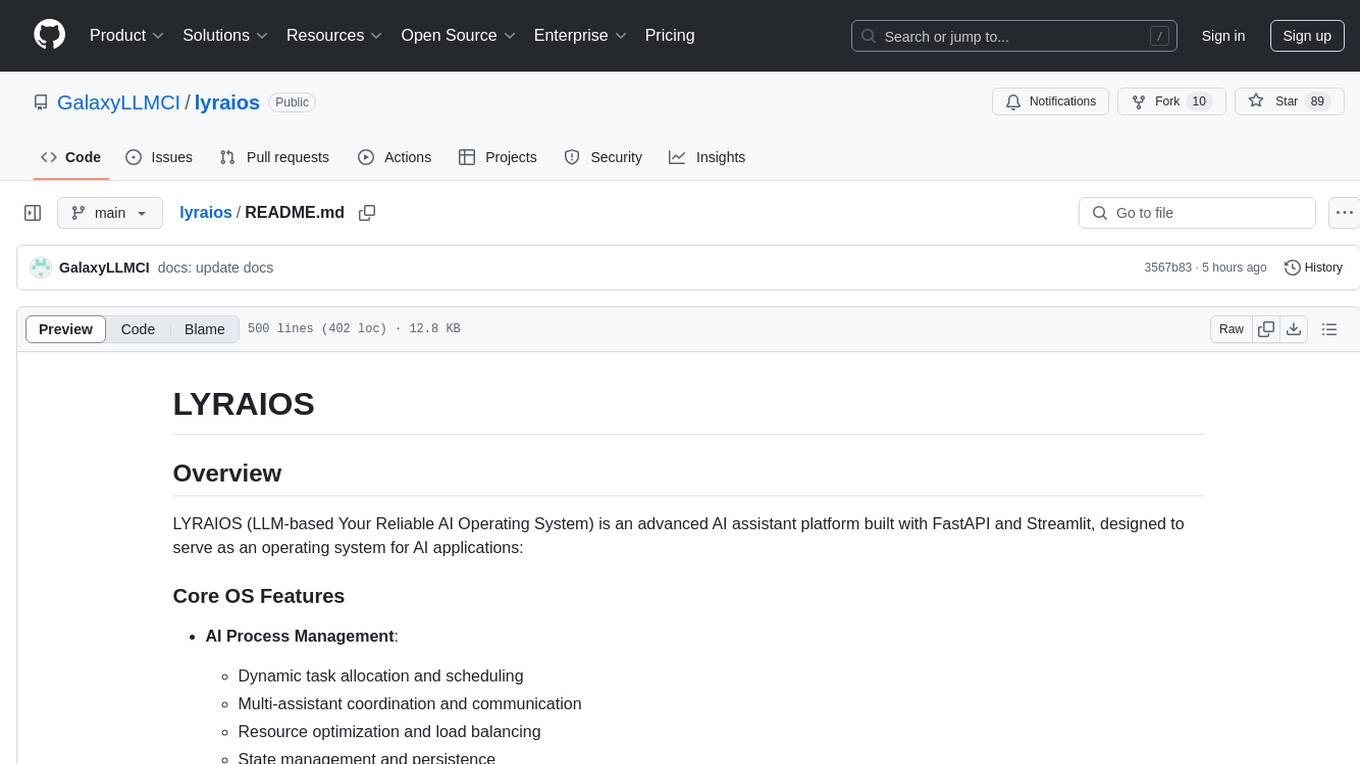
lyraios
LYRAIOS (LLM-based Your Reliable AI Operating System) is an advanced AI assistant platform built with FastAPI and Streamlit, designed to serve as an operating system for AI applications. It offers core features such as AI process management, memory system, and I/O system. The platform includes built-in tools like Calculator, Web Search, Financial Analysis, File Management, and Research Tools. It also provides specialized assistant teams for Python and research tasks. LYRAIOS is built on a technical architecture comprising FastAPI backend, Streamlit frontend, Vector Database, PostgreSQL storage, and Docker support. It offers features like knowledge management, process control, and security & access control. The roadmap includes enhancements in core platform, AI process management, memory system, tools & integrations, security & access control, open protocol architecture, multi-agent collaboration, and cross-platform support.
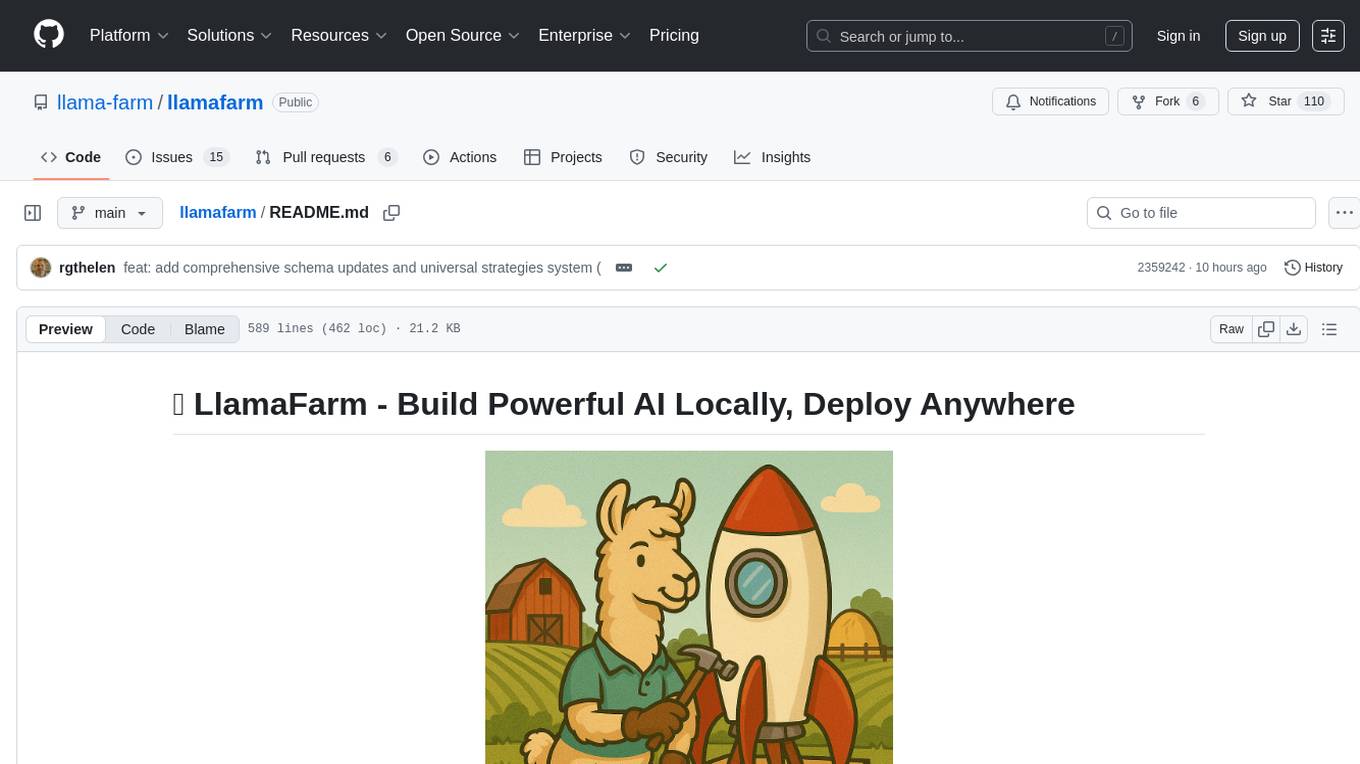
llamafarm
LlamaFarm is a comprehensive AI framework that empowers users to build powerful AI applications locally, with full control over costs and deployment options. It provides modular components for RAG systems, vector databases, model management, prompt engineering, and fine-tuning. Users can create differentiated AI products without needing extensive ML expertise, using simple CLI commands and YAML configs. The framework supports local-first development, production-ready components, strategy-based configuration, and deployment anywhere from laptops to the cloud.
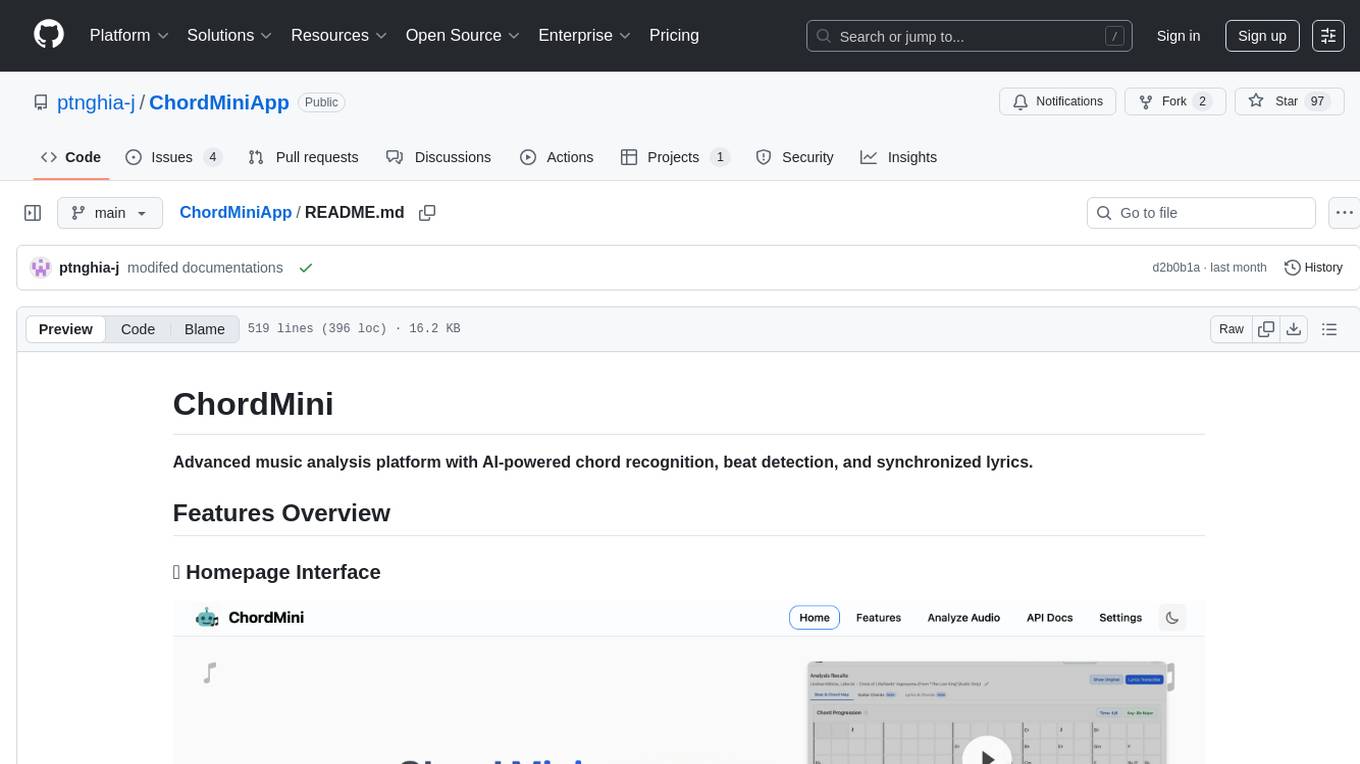
ChordMiniApp
ChordMini is an advanced music analysis platform with AI-powered chord recognition, beat detection, and synchronized lyrics. It features a clean and intuitive interface for YouTube search, chord progression visualization, interactive guitar diagrams with accurate fingering patterns, lead sheet with AI assistant for synchronized lyrics transcription, and various add-on features like Roman Numeral Analysis, Key Modulation Signals, Simplified Chord Notation, and Enhanced Chord Correction. The tool requires Node.js, Python 3.9+, and a Firebase account for setup. It offers a hybrid backend architecture for local development and production deployments, with features like beat detection, chord recognition, lyrics processing, rate limiting, and audio processing supporting MP3, WAV, and FLAC formats. ChordMini provides a comprehensive music analysis workflow from user input to visualization, including dual input support, environment-aware processing, intelligent caching, advanced ML pipeline, and rich visualization options.
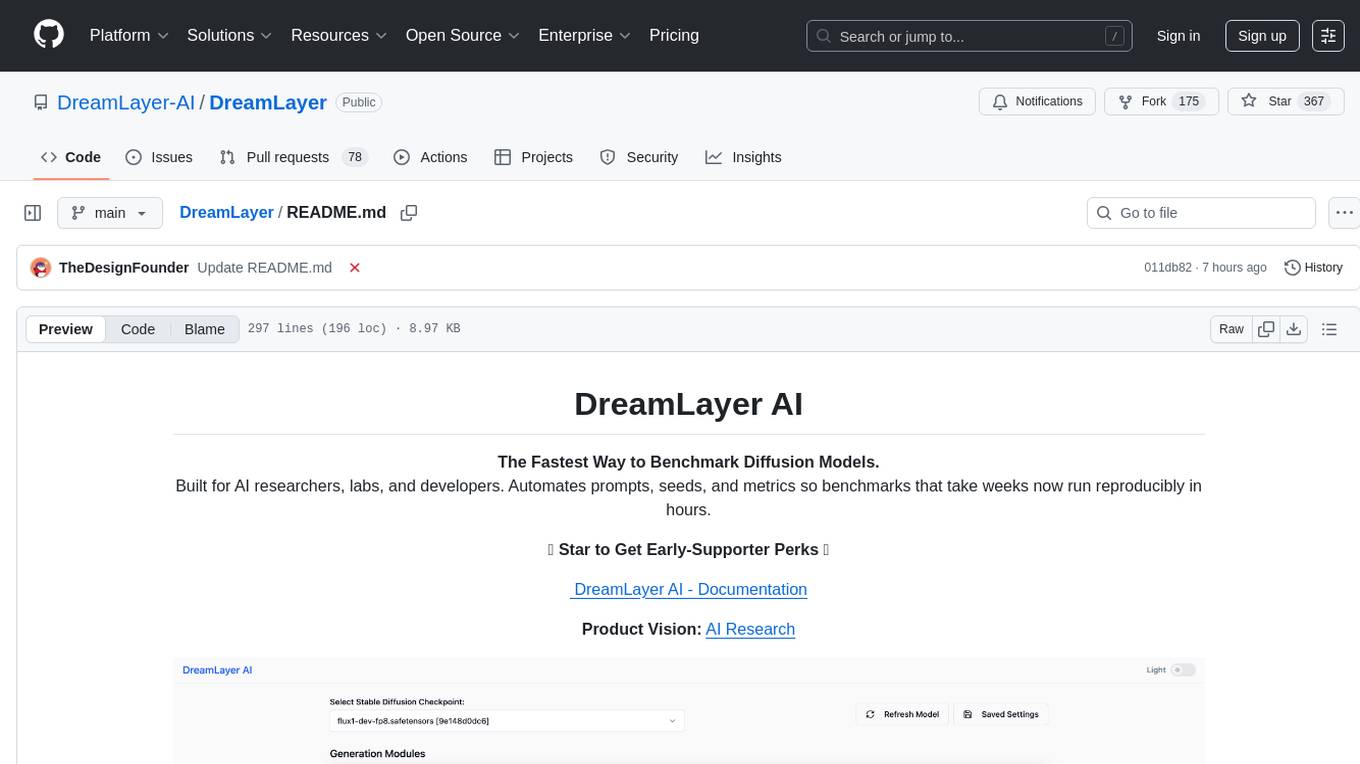
DreamLayer
DreamLayer AI is an open-source Stable Diffusion WebUI designed for AI researchers, labs, and developers. It automates prompts, seeds, and metrics for benchmarking models, datasets, and samplers, enabling reproducible evaluations across multiple seeds and configurations. The tool integrates custom metrics and evaluation pipelines, providing a streamlined workflow for AI research. With features like automated benchmarking, reproducibility, built-in metrics, multi-modal readiness, and researcher-friendly interface, DreamLayer AI aims to simplify and accelerate the model evaluation process.
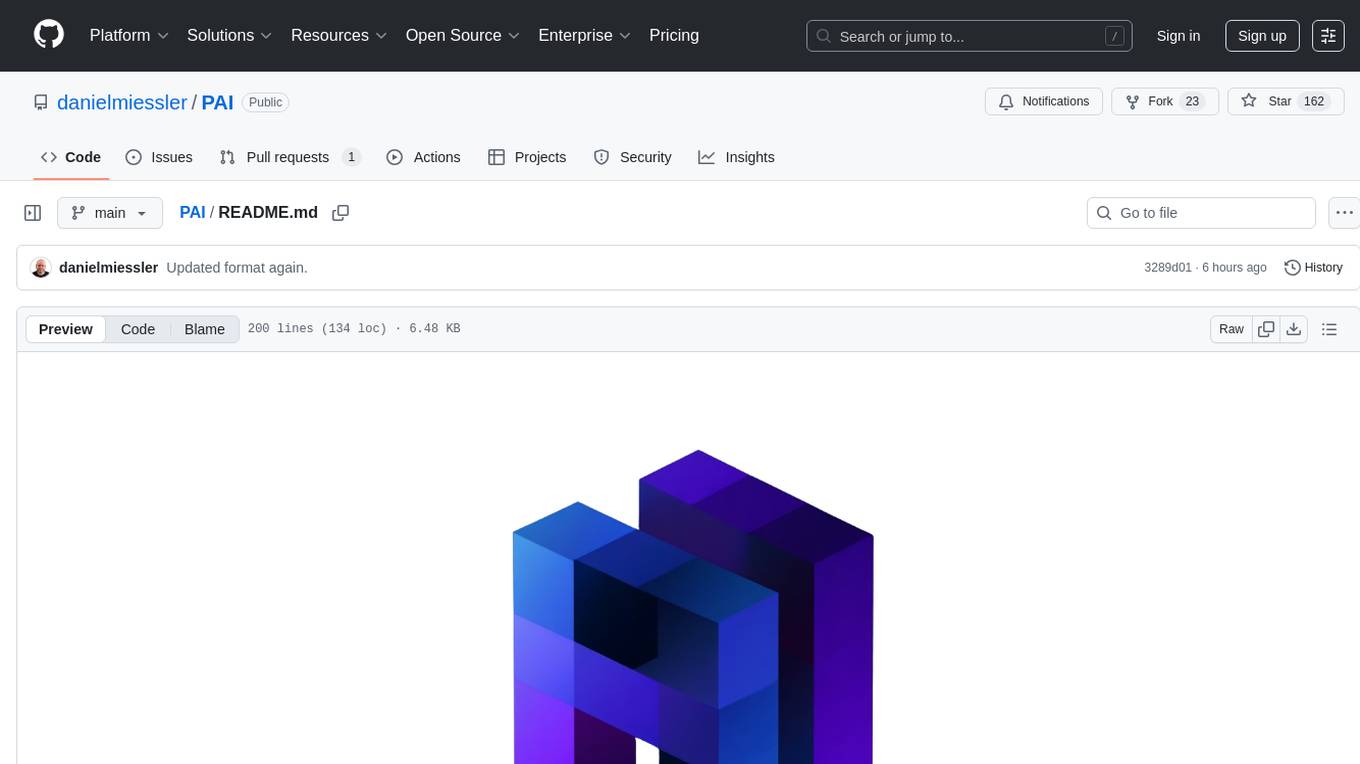
PAI
PAI is an open-source personal AI infrastructure designed to orchestrate personal and professional lives. It provides a scaffolding framework with real-world examples for life management, professional tasks, and personal goals. The core mission is to augment humans with AI capabilities to thrive in a world full of AI. PAI features UFC Context Architecture for persistent memory, specialized digital assistants for various tasks, an integrated tool ecosystem with MCP Servers, voice system, browser automation, and API integrations. The philosophy of PAI focuses on augmenting human capability rather than replacing it. The tool is MIT licensed and encourages contributions from the open-source community.
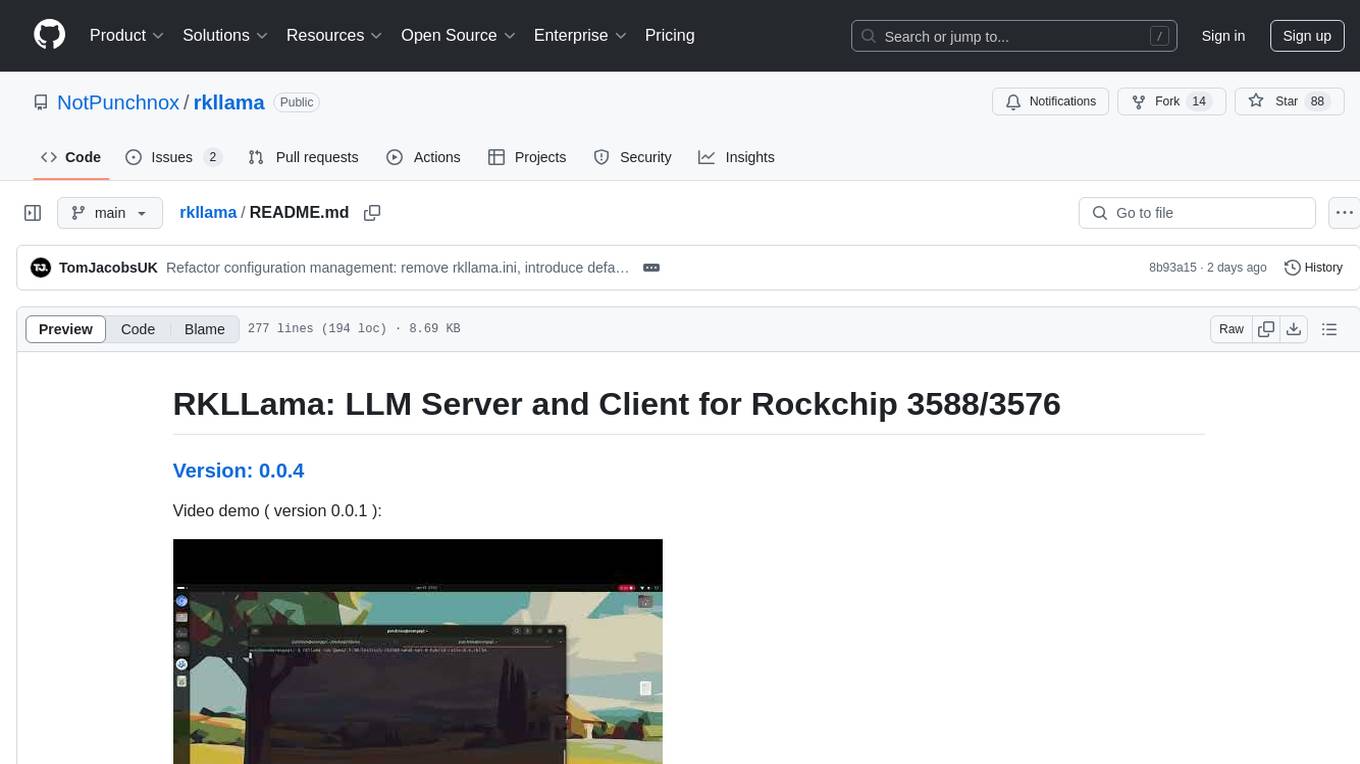
rkllama
RKLLama is a server and client tool designed for running and interacting with LLM models optimized for Rockchip RK3588(S) and RK3576 platforms. It allows models to run on the NPU, with features such as running models on NPU, partial Ollama API compatibility, pulling models from Huggingface, API REST with documentation, dynamic loading/unloading of models, inference requests with streaming modes, simplified model naming, CPU model auto-detection, and optional debug mode. The tool supports Python 3.8 to 3.12 and has been tested on Orange Pi 5 Pro and Orange Pi 5 Plus with specific OS versions.
For similar tasks

serverless-chat-langchainjs
This sample shows how to build a serverless chat experience with Retrieval-Augmented Generation using LangChain.js and Azure. The application is hosted on Azure Static Web Apps and Azure Functions, with Azure Cosmos DB for MongoDB vCore as the vector database. You can use it as a starting point for building more complex AI applications.

ChatGPT-Telegram-Bot
ChatGPT Telegram Bot is a Telegram bot that provides a smooth AI experience. It supports both Azure OpenAI and native OpenAI, and offers real-time (streaming) response to AI, with a faster and smoother experience. The bot also has 15 preset bot identities that can be quickly switched, and supports custom bot identities to meet personalized needs. Additionally, it supports clearing the contents of the chat with a single click, and restarting the conversation at any time. The bot also supports native Telegram bot button support, making it easy and intuitive to implement required functions. User level division is also supported, with different levels enjoying different single session token numbers, context numbers, and session frequencies. The bot supports English and Chinese on UI, and is containerized for easy deployment.
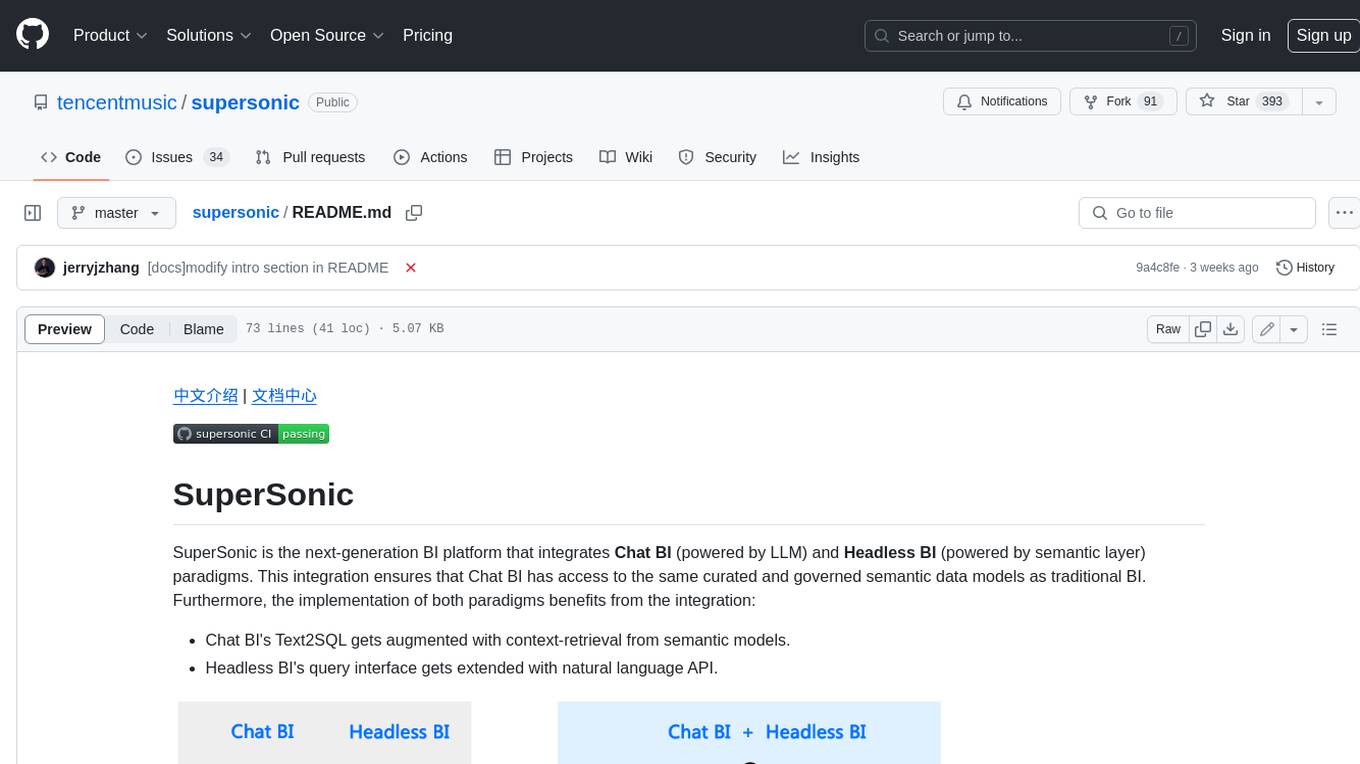
supersonic
SuperSonic is a next-generation BI platform that integrates Chat BI (powered by LLM) and Headless BI (powered by semantic layer) paradigms. This integration ensures that Chat BI has access to the same curated and governed semantic data models as traditional BI. Furthermore, the implementation of both paradigms benefits from the integration: * Chat BI's Text2SQL gets augmented with context-retrieval from semantic models. * Headless BI's query interface gets extended with natural language API. SuperSonic provides a Chat BI interface that empowers users to query data using natural language and visualize the results with suitable charts. To enable such experience, the only thing necessary is to build logical semantic models (definition of metric/dimension/tag, along with their meaning and relationships) through a Headless BI interface. Meanwhile, SuperSonic is designed to be extensible and composable, allowing custom implementations to be added and configured with Java SPI. The integration of Chat BI and Headless BI has the potential to enhance the Text2SQL generation in two dimensions: 1. Incorporate data semantics (such as business terms, column values, etc.) into the prompt, enabling LLM to better understand the semantics and reduce hallucination. 2. Offload the generation of advanced SQL syntax (such as join, formula, etc.) from LLM to the semantic layer to reduce complexity. With these ideas in mind, we develop SuperSonic as a practical reference implementation and use it to power our real-world products. Additionally, to facilitate further development we decide to open source SuperSonic as an extensible framework.

chat-ollama
ChatOllama is an open-source chatbot based on LLMs (Large Language Models). It supports a wide range of language models, including Ollama served models, OpenAI, Azure OpenAI, and Anthropic. ChatOllama supports multiple types of chat, including free chat with LLMs and chat with LLMs based on a knowledge base. Key features of ChatOllama include Ollama models management, knowledge bases management, chat, and commercial LLMs API keys management.
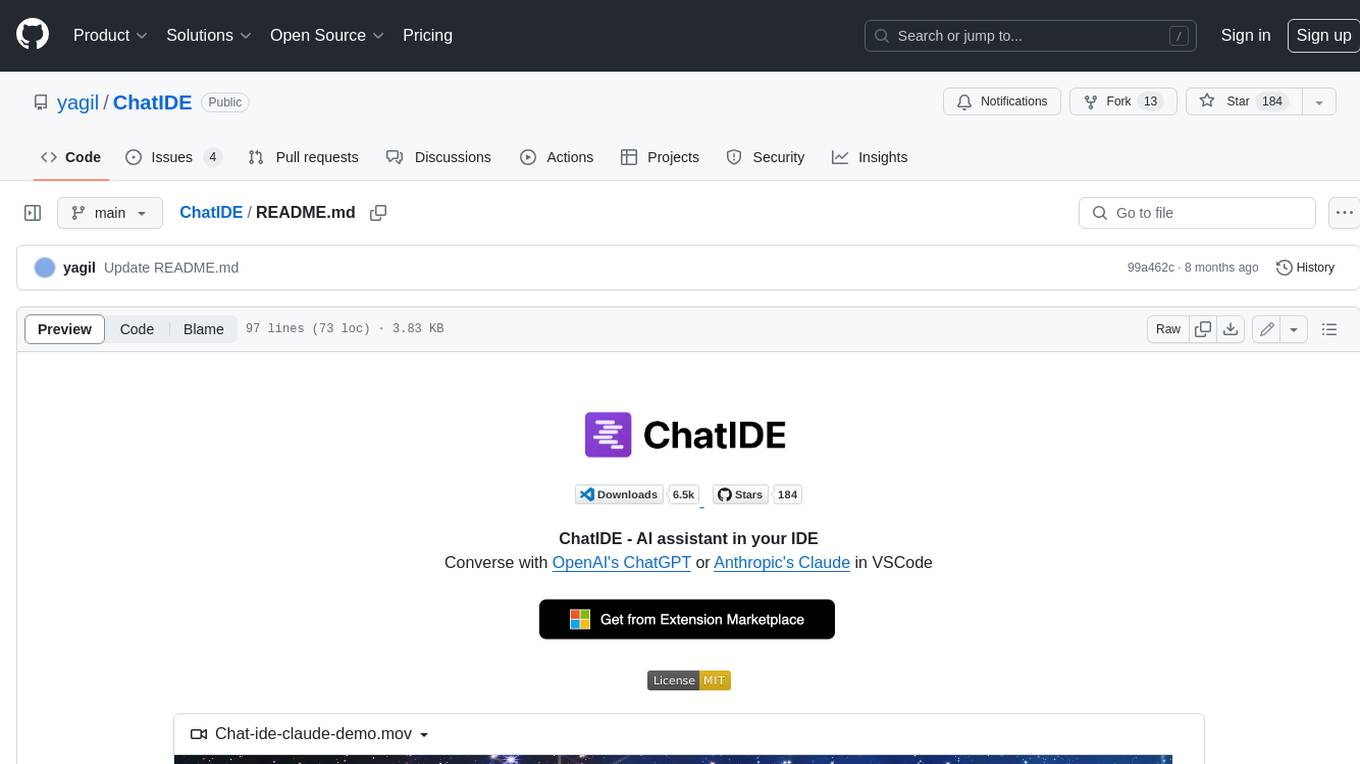
ChatIDE
ChatIDE is an AI assistant that integrates with your IDE, allowing you to converse with OpenAI's ChatGPT or Anthropic's Claude within your development environment. It provides a seamless way to access AI-powered assistance while coding, enabling you to get real-time help, generate code snippets, debug errors, and brainstorm ideas without leaving your IDE.

azure-search-openai-javascript
This sample demonstrates a few approaches for creating ChatGPT-like experiences over your own data using the Retrieval Augmented Generation pattern. It uses Azure OpenAI Service to access the ChatGPT model (gpt-35-turbo), and Azure AI Search for data indexing and retrieval.
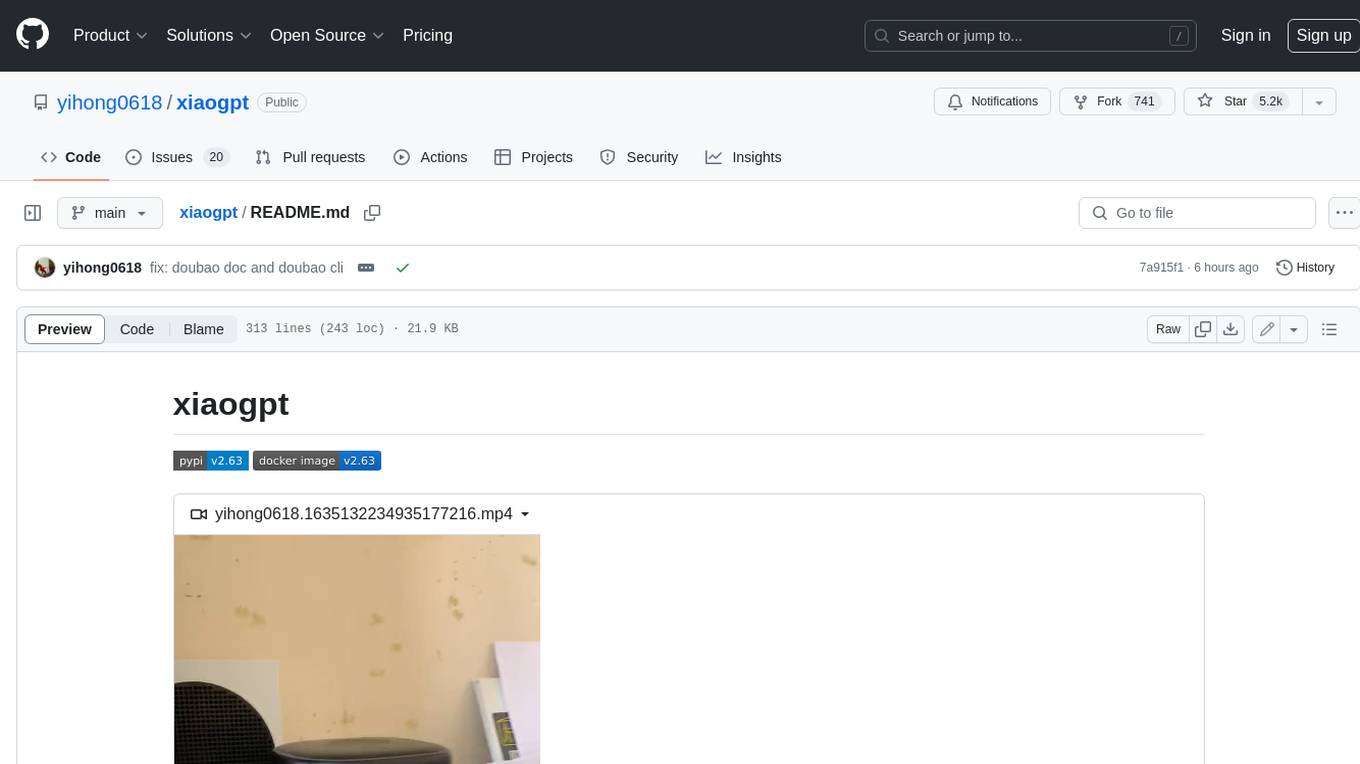
xiaogpt
xiaogpt is a tool that allows you to play ChatGPT and other LLMs with Xiaomi AI Speaker. It supports ChatGPT, New Bing, ChatGLM, Gemini, Doubao, and Tongyi Qianwen. You can use it to ask questions, get answers, and have conversations with AI assistants. xiaogpt is easy to use and can be set up in a few minutes. It is a great way to experience the power of AI and have fun with your Xiaomi AI Speaker.
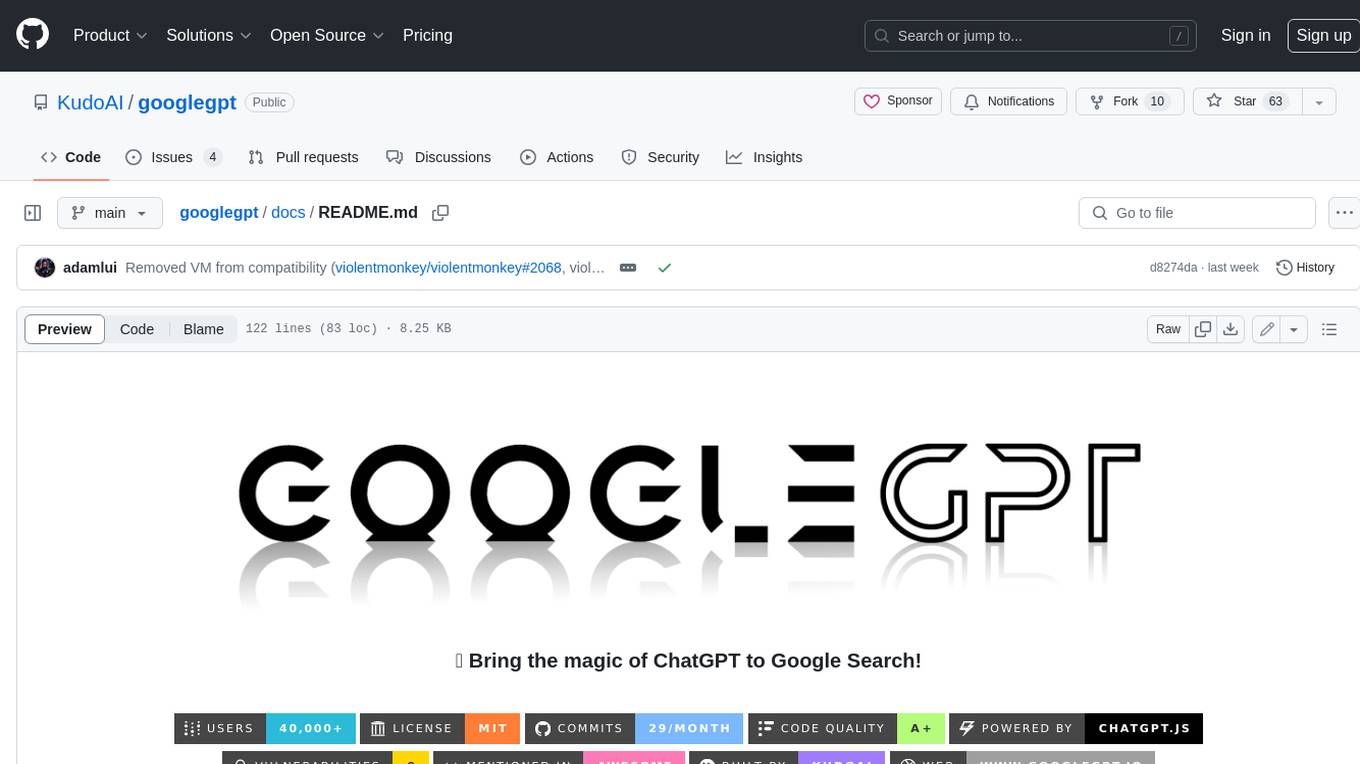
googlegpt
GoogleGPT is a browser extension that brings the power of ChatGPT to Google Search. With GoogleGPT, you can ask ChatGPT questions and get answers directly in your search results. You can also use GoogleGPT to generate text, translate languages, and more. GoogleGPT is compatible with all major browsers, including Chrome, Firefox, Edge, and Safari.
For similar jobs

weave
Weave is a toolkit for developing Generative AI applications, built by Weights & Biases. With Weave, you can log and debug language model inputs, outputs, and traces; build rigorous, apples-to-apples evaluations for language model use cases; and organize all the information generated across the LLM workflow, from experimentation to evaluations to production. Weave aims to bring rigor, best-practices, and composability to the inherently experimental process of developing Generative AI software, without introducing cognitive overhead.

LLMStack
LLMStack is a no-code platform for building generative AI agents, workflows, and chatbots. It allows users to connect their own data, internal tools, and GPT-powered models without any coding experience. LLMStack can be deployed to the cloud or on-premise and can be accessed via HTTP API or triggered from Slack or Discord.

VisionCraft
The VisionCraft API is a free API for using over 100 different AI models. From images to sound.

kaito
Kaito is an operator that automates the AI/ML inference model deployment in a Kubernetes cluster. It manages large model files using container images, avoids tuning deployment parameters to fit GPU hardware by providing preset configurations, auto-provisions GPU nodes based on model requirements, and hosts large model images in the public Microsoft Container Registry (MCR) if the license allows. Using Kaito, the workflow of onboarding large AI inference models in Kubernetes is largely simplified.

PyRIT
PyRIT is an open access automation framework designed to empower security professionals and ML engineers to red team foundation models and their applications. It automates AI Red Teaming tasks to allow operators to focus on more complicated and time-consuming tasks and can also identify security harms such as misuse (e.g., malware generation, jailbreaking), and privacy harms (e.g., identity theft). The goal is to allow researchers to have a baseline of how well their model and entire inference pipeline is doing against different harm categories and to be able to compare that baseline to future iterations of their model. This allows them to have empirical data on how well their model is doing today, and detect any degradation of performance based on future improvements.

tabby
Tabby is a self-hosted AI coding assistant, offering an open-source and on-premises alternative to GitHub Copilot. It boasts several key features: * Self-contained, with no need for a DBMS or cloud service. * OpenAPI interface, easy to integrate with existing infrastructure (e.g Cloud IDE). * Supports consumer-grade GPUs.

spear
SPEAR (Simulator for Photorealistic Embodied AI Research) is a powerful tool for training embodied agents. It features 300 unique virtual indoor environments with 2,566 unique rooms and 17,234 unique objects that can be manipulated individually. Each environment is designed by a professional artist and features detailed geometry, photorealistic materials, and a unique floor plan and object layout. SPEAR is implemented as Unreal Engine assets and provides an OpenAI Gym interface for interacting with the environments via Python.

Magick
Magick is a groundbreaking visual AIDE (Artificial Intelligence Development Environment) for no-code data pipelines and multimodal agents. Magick can connect to other services and comes with nodes and templates well-suited for intelligent agents, chatbots, complex reasoning systems and realistic characters.